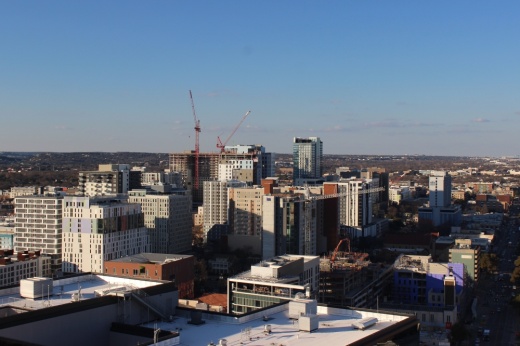Austin officials are moving to expand the University Neighborhood Overlay, a voluntary development plan for the West University area that's supported a wave of relatively dense and affordable housing since its creation 20 years ago. Alongside that request, City Council also asked to roll out other updates that could affect the thousands of students in the area as well as residents in the surrounding neighborhoods.
The context
The UNO bonus program covers much of West Campus and was passed in the early 2000s, allowing new residential construction with greater height and density near UT. Developers building under UNO must add some new affordable housing based on local income limits.
Dozens of projects with thousands of units have risen near downtown and UT under UNO's rules. City officials have promoted UNO as one of Austin's most impactful development bonus programs based on the hundreds of affordable units and bedrooms it's produced, and the denser style of construction encouraged there compared to many other parts of town.
What happened
A resolution from council member Zo Qadri, who represents downtown including the UT campus, was approved April 18 and calls to expand the area of the UNO affordable building program in addition to:
- Increasing or removing building height limits, with an "appropriate step down" between the new zones and adjacent neighborhoods
- Requiring more street-level commercial space in exchange for greater development allowances
- Bringing healthier food options to what he called the "West Campus food desert"
- Enacting new tenant protections in the area
- Improving sidewalks and other pedestrian features in the campus area
- Considering new pocket parks around West Campus
Final proposals for UNO's expansion and the other West Campus updates are expected next spring.
Quote of note
"A long while ago I lived in West Campus, I know it to be a great community, but there’s a lot of ways that we can make it better, including the quality of life for those who call it home," Qadri said. "UNO was previously amended in 2014 and 2019, and now we have had enough time to gather enough data to continue to build off the successes. So as we work to update and streamline our density bonus programs, it is an opportune time to align UNO with [equitable transit-oriented development] and Project Connect goals."
By the numbers
Council's vote to advance UNO's expansion comes soon after the city finalized a review of the program's results at the 20-year mark, the product of a 2023 resolution asking to take a closer look at student housing issues in Austin.
The city's recent UNO evaluation, available here, found that the program has successfully encouraged affordable student housing development—but likely not enough. As of 2023, the city tracked 572 units and 911 beds that were income-restricted under UNO. Nearly 25,000 UT students receive financial aid, many of whom could qualify. Looking ahead, planned development is bringing 281 affordable bedrooms and 382 affordable units in future years.
Overall, the city found UNO's effect on affordability has been "mostly positive." While housing prices have spiked across the city, the Austin metro's 27% rental growth from 2020 to 2022 is nearly double the 15% increase in the UNO area over that time.
Over a longer period, UNO's rents are nearly 14% lower, or more than $200 cheaper, today than at the program's creation when accounting for inflation, according to data provided to the city by CoStar. Still, UNO remains a relatively expensive place to rent.
"Housing near UT campus is in high demand for students, who are willing to pay a premium for the desirable location. As a result, market rates in West Campus have been historically higher compared to the rest of Austin and continue to be so," the city report states.
Another change
While the UNO expansion will continue into 2025, council locked in one change aimed at improving residents' well-being by mandating access to natural light in new bedrooms.
Austin builders have traditionally not been required to provide access to natural light in residences. Research and tenant testimony have pointed to a variety of negative side effects stemming from the lack of natural light, and windowless bedroom construction has been blocked in other cities. The city's UNO analysis also found that the existing regulations, while resulting in a denser and more affordable residential neighborhood, promotes the kind of housing that "may harm its residents."
Qadri first targeted what he called a "loophole" in city code allowing for windowless bedrooms in September after the practice drew negative attention around the campus area. Additionally, the new UNO resolution asks to require natural light, and potentially ventilation, in bedrooms.





